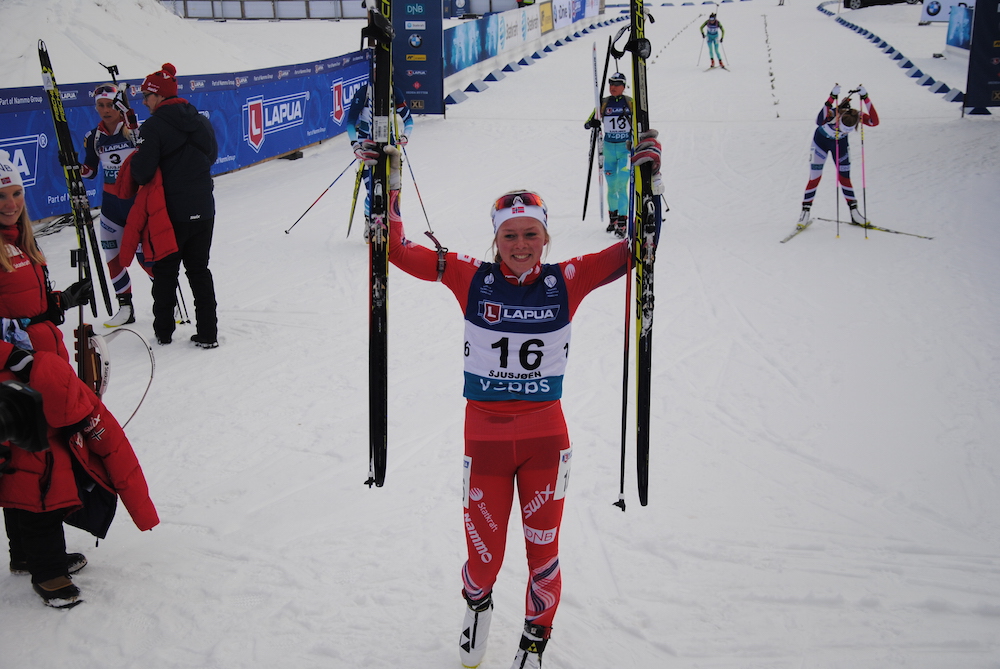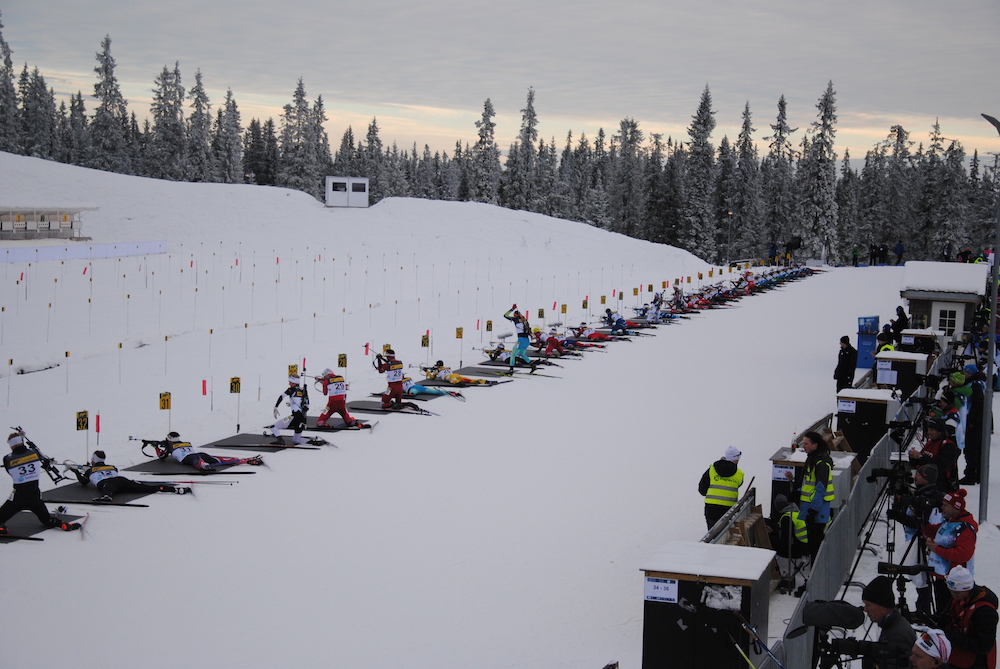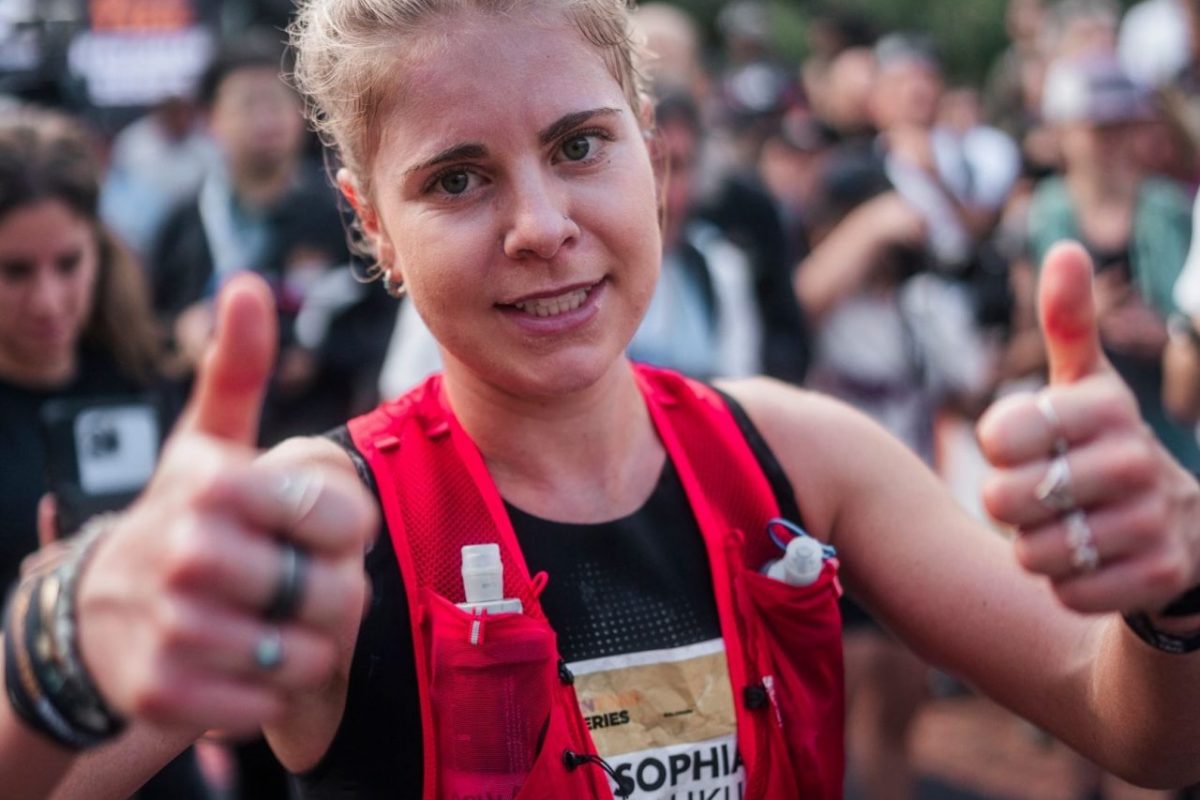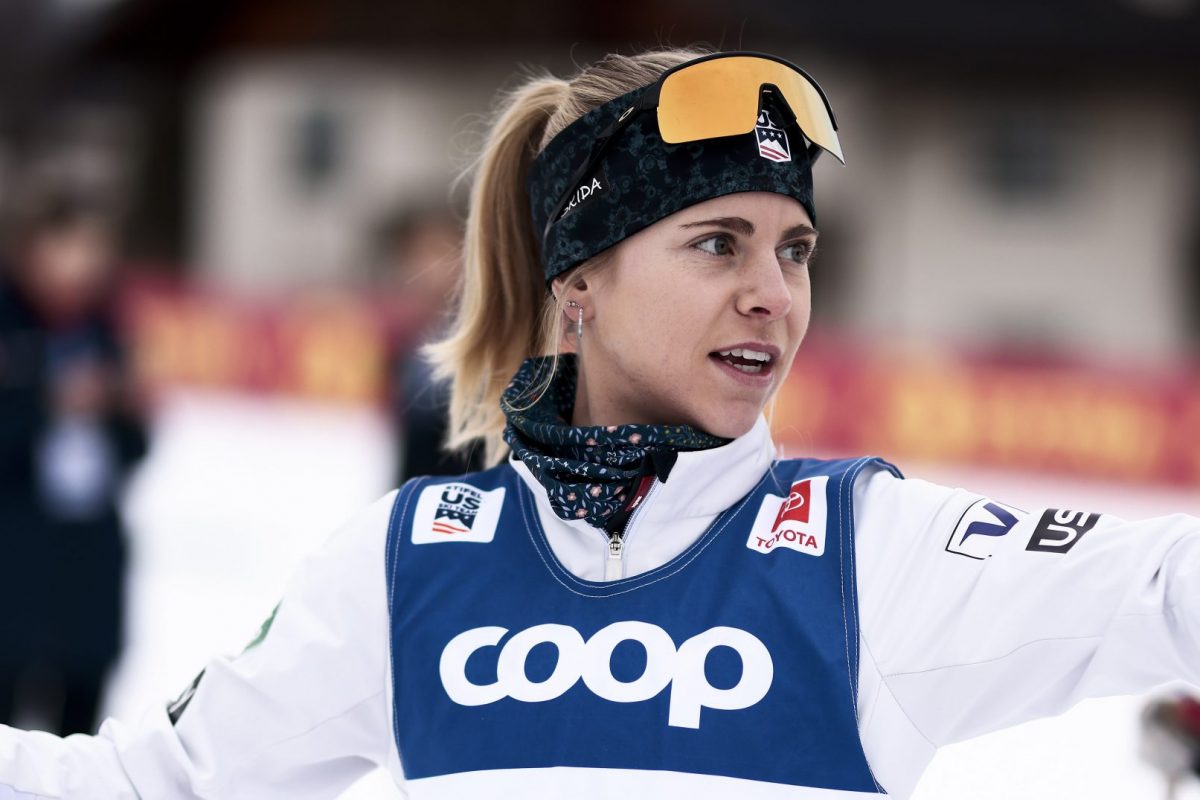
SJUSJØEN, Norway–Before Sunday’s women’s mass start even began, expectations were high for an exciting race: all nine of the best-seeded biathletes were individual or relay podium finishers during the previous World Cup season, and bib number ten belonged to Junior World Champion Ingrid Landmark Tandrevold.
And not surprisingly, there was plenty of drama over 12.5 kilometers and four shooting stages.
The first lap was relatively even until the final climb where Tiril Eckhoff of Norway, Yuliya Dzhima of Ukraine, and Celia Aymonier of France created a slight gap. But the first shooting mixed up the order and set the standard for the remainder of the race. Dzhima hit five targets, as did Ukrainian teammate Olena Pidrushna, along with Anais Bescond and Anais Chevalier of France. The winner of Saturday’s sprint, Justine Braisaz of France, missed once.
Leaving the range in first, Dzhima held this position until the finish line. She hit all 20 targets except for her final shot, which was too far to the upper-left corner.

Dzhima skated hard with every stride. At times it seemed like she was breathing heavily, but the gap to second-place finisher Pidhrushna was never shorter than eight seconds, which was after the first shooting. From there on, Dzhima was in the clear. After 8.8 kilometers she had amassed a lead of 35 seconds to Pidhrushna and well over a minute to Braisaz, who eventually finished in third place.
During the post-race press conference, Dzhima – an Olympic relay gold medalist from 2014 – said that she was “unaware of how big the gap was.” While Pidhrushna sometimes seemed to be closing part of the gap, Dzhima’s spot in the lead was never really threatened and she finished the race with an 18.5 second margin.
Pidhrushna, who hit 20 out 20 targets, had a solid margin over Braisaz (+37.3), who had missed a shot each in the first three shooting stages.
Asked what she thought of her own performance, Dzhima replied, “I am very happy about today’s race, and the fact that there was almost no wind made it a little easier both to shoot and ski.”
The competitions were excellent prep for the World Cup, which starts in two weeks, Dzhima said.
“The downhills!” She laughed when asked what the easiest part of the course was. Pidhrushna agreed.
“We like the tracks in Sjusjøen really well,” the women said. “They are tough but very high quality, and the final climb is really hard. But once we finish that one we are ready for any course.”
But the happiest woman on the course today was without a doubt the fourth-place finisher, 18-year old Karoline Erdal. Last season, Erdal won the 6 k sprint and anchored Norway’s bronze medal relay team at World Junior Championships.

On Sunday, the young Norwegian hit all 20 targets and crossed the finish line 1:08.9 after Dzhima.
“This is totally insane, I’ve never shot as well as today, and I’ve never been this happy,” she told Norwegian broadcaster NRK after crossing the finish line. “This is great and it proves that I’ve been doing the right things in training.”
Same Result, Different Fourcade
Later in the afternoon, the men’s 15 k mass start was set to be just as exciting as the women’s race. The big question was, would the French team be able to live up to the previous day’s strong performance? In the sprint, five-time World Cup champion Martin Fourcade had surged to a convincing victory, and the French had put five men in the top six.
On Sunday, they lived up to expectations.
The French team lacked Fourcade, who told L’equipe that he decided yesterday to pass on the mass start due to a lack of energy.
But the French still repeated their feat of stealing five out of top six finishes. Martin’s older brother Simon Fourcade won with Simon Desthieux second, just three seconds back. Krasimir Anev of Bulgaria placed third (+18.1), before a trio of Frenchmen: Fabien Claude (+29.2), Jean Guillaume Beatrix (+1:01.7), and Quentin Fillon Maillet (+1:04.4).

“I had to represent my family today, and I am really happy about my race,” Fourcade said during his post race interview with NRK. “I was a little unlucky with the wind yesterday, but I was happy today. I was good in the shooting range and in the track so I am full of confidence for the beginning of the season in Östersund in two weeks… My goals are a little the same as last season, top ten in the World Cup and a medal at the World Championships.”
It was clear from the very beginning that the French didn’t just come to Sjusjøen to try, they meant business. After a first lap that was calm enough for the entire field to stay together, the French were among the top shooters. After the first stage Fourcade, Desthiuex, Claude, and Beatrix had hit all their targets, along with Anev and Norway’s Johannes Tingnes Bø.
This good performance on the shooting range continued on throughout the race except for Bø, who missed three shots in the second shooting. With it, Norway’s hopes for a podium seemed to slip away.
The remaining five skated on and were joined by Fillon Maillet, who had missed twice in his first shooting but made up ground.
By 7.8 kilometers – just over the halfway point – a leading pack had developed consisting of three French athletes and Anev. Rather than pushing the pace, all of them skated easily and it appeared that Norway’s Henrik L’Abee-Lund and Ole Einar Bjørndalen, in pursuit 13 seconds behind, still had a chance to catch them.
But L’Abee-Lund missed twice in his third shooting, and Bjørndalen once; Claude was the only one in the lead who didn’t hit all targets, and dropped from the front pack.
The competition wasn’t quite over yet. Fourcade delivered a fourth lap so fast that nobody else could match him, then headed to the final shooting. Where he had shot the fastest of anyone in the field on the previous stage, Fourcade took his time to make sure he knocked down all five targets. He held a lead of 20 second going into the final lap; Desthieux closed with the fastest lap time of the day, but was unable to catch his older teammate.
“I think we have a strong team this year, and the young boys are pushing me,” Fourcade said. “It really is a good team spirit this season.”




